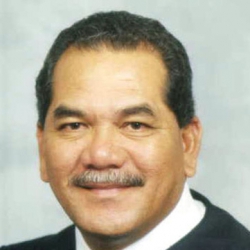
Edward Manibusan Became the 1st Elected Attorney General of the Commonwealth of the Northern Marianas Islands in January 2015.
The United States Commonwealth of Saipan is considering amendments to its casino laws which would grant to the Commonweath Casino Commission broader authority than it previously has had. The law has raised concerns about reform-minded politicians in the Marianas Islands, while Saipan’s Attorney General has criticized the proposals.
The proposals being discussed are called House Bill 19-95. The Attorney General addressed his concerns to Saipan’s Senate Committee on Resources, Economic Development, and Programs in an open letter to the Senate committee on Friday of last week.
Citing the “extraordinarily broad exceptions” to the Open Government Act the new casino law would entail, CNMI Attorney General Edward Manibusan urged the Commonwealth Senate to reject the proposed amendment.
The Attorney General urged the lawmakers to instead pass a narrower exception to the public records law. He suggested, if the bill was passed in its current form, the Commonwealth Casino Commission would be able to engage in widespread corruption. Little transparency would exist, allowing the commissioners to make decisions in the shadows.
Higher Salaries and a Possible Slush Fund
Edward Manibusan said the amendment would increase the salary of commissioners to a great degree. He noted that the salaries of the commissioners would be increased to $65,000, which is a higher salary than is offered to the island’s lieutenant governor, its tax auditors, and its public defenders.
He said the bill also would create a “revolving fund” to support the Casino Commission’s operations. While a gaming commission needs to be funded from the public treasury, the creation of a public fund with a lack of transparency opens the door for the likely creation of a slush fund by commission members.
In the letter, the Attorney General said, “The Legislature should determine whether the proposed salary increase for the commissioners is appropriate.” He added that lawmakers needed to decide whether a gambling license holders could host games “on any of its properties, or only on certain types of properties [casino].”
Legal Gambling Anywhere
The AG said the bill would create a legal environment in which a casino licensee could hold legal games anywhere in the island “so long as they controlled the facilities”. In constructing a worst-case scenario for where games might be held, Manibusan said he could envision legal gaming taking place in “restaurants, laundromats, gas stations, concession stands, [and] apartment buildings.”
Gaming license operators tend to be among the wealthiest residents in a city, so it is likely these operators might own restaurants and rental properties, too. Under the circumstances, any place they legally owned could be turned into a makeshift casino or sportsbook. While it is less likely vendor could open vending booths for gambling, Mr. Manibusan suggested House Bill 19-95 might open the door for such deal-making.
New Jersey Officials Cited as Exemplary
In the course of his admonition to the Senate Committee on Resources, the Attorney General cited New Jersey’s Division of Gaming Enforcement as an exemplary regulatory agency. He said, “If the commission were allowed to operate in this manner, it would be completely free of government oversight, making it a prime candidate for corruption.”
Citing New Jersey’s Casino Control Act as a “better model”, Mr. Manibusan said, “Other states that allow for casino gambling do no grant such sweeping exceptions to public records laws.”
How New Jersey Is Different
Discussing New Jersey’s system, he mentioned specific actions which are kept confidential from the public, such as “internal control procedures, revenues, and background checks.”
Then he mentioned powers the Senate was considering giving to Saipan’s Casino Commission, which are not allowed in New Jersey, such as regulations and disciplinary orders. Also, New Jersey gaming officials cannot “meet in secret”–they must keep minutes of what is said in their meetings.
Fees for Inspections
One of the most egregious new rules in the Attorney General’s mind is the ability for the commission to set fees for inspections. Under that system, the Commonwealth Casino Commission would be able to set “very high fees” with the purpose of “enriching the commission and preventing the public from learning about its activities“.
About Saipan
During World War II, Saipan was of vast strategic importance. The Japanese Empire seized the Marianas Islands and held them until the summer of 1944, when the United States seized them in a naval battle and amphibious invasion. With Saipan, Tinian, and Guam under U.S. control, the United States Army Air Force was within the Japanese long range defense perimeter and could therefore bomb Japanese cities.
The fall of Saipan led to the ouster of Hideki Tojo from his role of Japanese Prime Minister. It also led to a decisive battle in which the Japanese aircraft carrier force was destroyed in what was called the Marianas Turkey Shoot. The Battle of Saipan had appalling casualties on both sides, so that soldiers and marines who later were told of horrors might say, “Don’t tell me; I fought on Saipan”.
The John Woo film starring Nicholas Cage, The Windtalkers, was set in the Battle of Saipan. Norman Mailer’s 1948 book, “The Naked and The Dead”, is based on his experiences fighting in the Philippines, but is set on a fictional island (Anopopei) which bears a striking strategic resemblance to Saipan. Since World War II, Saipan has remained a U.S. Commonwealth with local autonomy. Found in the Central Pacific, it retains its strategic character to this day.
